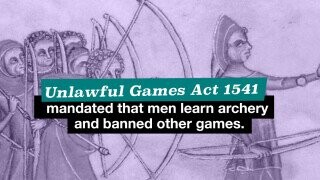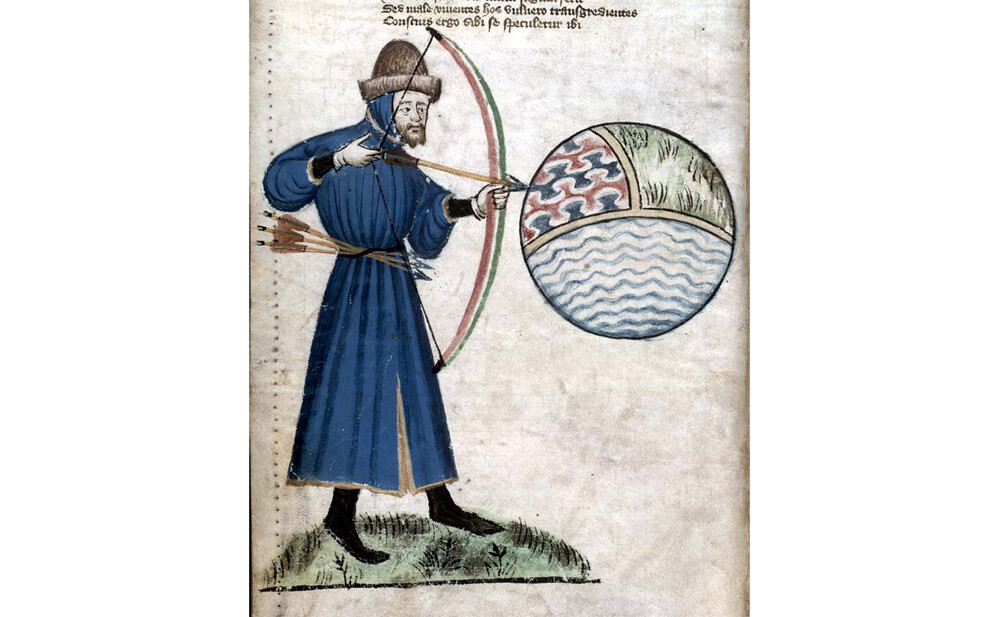5 Laws That Made Life Miserable in the Old Days

Laws are all bad, of course. For example, one law says you have to defecate in a bathroom, instead of directly on the hood of your neighbor’s car. What’s the logic behind that? The car is literally right there!
However, while we can all debate the necessity of laws that constrict us today, we used to live by even worse laws, which we finally got around to putting in the trash. If you were unlucky enough to be born a few centuries ago, the long arm of the law might put you in a headlock for breaking such rules as...
No Kissing Your Spouse
Captain Thomas Kemble spent three years at sea in the 1650s. He crossed the Atlantic Ocean, collected prisoners of war and shipped goods from the lumber mills that he operated. Finally, he pulled back into port, returning to Boston. He went from the harbor to his home, where his wife met him at the door. They kissed, in full view of anyone who happened to be staring their way.
Don't Miss
For this, he was found guilty of “lewd and unseemly behavior.” Plus, he’d kissed his wife publicly on Sunday, when he should have been reading the Bible, which famously features no love whatever. The Puritans upholding the laws sentenced Kemble to two hours in the stocks.

“Worth it,” we figure he quipped as the town elders turned the key. Once his punishment was done, he returned to his house. And now, behind closed doors — and we recommend all sensitive members of our audience cover their eyes before reading this next part — we imagine that, maybe, he and his wife kissed again.
No Lipstick
Around this same time, a preacher named Thomas Hall denounced the institution of the wig. As much as you might associate powdered men’s wigs with this period, detractors like Hall said that they were “against the modest, civil and commendable custom of our nation, til lately that we began to follow the French and Spaniards, who yet are known Papists and Idolaters.” He published this in a treatise called “The Loathsomeness of Long Hair.”
Hall felt even more strongly about women’s fashion than he did about men’s. Makeup was “the devil’s work,” said he. If you tried applying lipstick, this was a bid to “ensnare others, and to kindle a fire and flame of lust in the hearts of those who cast their eyes upon you.”

If this attack remained the domain of random preachers, we wouldn’t have much to complain about, since some people with such views exist even today. But in 1770, the crusade against lipstick became enshrined in British law. Parliament passed a law banning lipstick, saying women found guilty “of seducing men into matrimony by a cosmetic means” were to be tried as witches. This is particularly bizarre because, by this point, the era of witch trials was largely over, and it was in fact a crime to accuse someone of witchcraft. But we suppose it’s too much to expect consistency from our witchcraft laws.
No Games But Archery
In the 16th century, England decided it had a problem. People were taking up a variety of new sports, turning away from beloved archery. What would happen now if everyone needed to fight, and the public needed bows to defend the country? What were they going to do, depend on the military? Nope, people needed to learn archery — everyone needed to learn archery.
The Unlawful Games Act 1541 said that every boy from age seven to 17 had to own a bow and two shafts. Above the age of 17, and every man must own a bow and four arrows. And if he hadn’t yet bought one, it was his employer’s responsibility to dock his pay until he had. In every “City, Town and Place,” inhabitants had to “exercise themselves with Long-Bows in shooting at the same, in Holy Days and other Times convenient.”

via Wiki Commons
If sports fans and supporters of a well-armed citizenry think this all sounds fine, note the other side of this law. All games other than archery were now banned for stretches of the year. These included bowling, half-bowling, coyting (yet another type of bowling), tennis, dice and all forms of cards. It also included games not explicitly mentioned, so for centuries afterward, people were breaking a law still on the books by playing just about anything.
England started repealing the act in the 19th century and was still working on getting rid of the rest of it well into the 20th. It took a long time because when you have 500-year-old laws on the books, they tend to be filled with impossible-to-understand language, and legislators fall asleep in the middle of reading the whole thing.
No Milling Your Own Grain
Stop us if you’re heard this one before, but being a peasant wasn’t great. You worked hard tilling the land, and if you technically worked fewer hours a year compared with people in the 21st century, well, that was because you spent your remaining time staying as motionless as possible to avoid burning calories and hastening your death by starvation.
When you grew plants, you’d wind up with grain. To turn the grain into flour, you had to send it over to the miller, who’d grind it for you, for a fee (to be paid in grain). This did not happen simply because the miller owned a mill and you didn’t. You sent your grain to the miller because you were required to, by law. If you were a Middle Ages peasant in Scotland and tried grinding your own grain by yourself, using whatever means you could cobble together, you were committing a crime.
Those means included quern-stones, which sound like landmarks that adventurers visit to gain skill points but instead are hand tools that humans have used on grain since the Stone Age. Archaeologists looking at the Middle Ages have found plenty examples of quern-stones suffering from sabotage. These are from when lords discovered peasants milling their own grain and punished the uppity entrepreneurs by breaking their stones. We dearly hope there were at least a few unrecorded instances of peasants losing their cool and responding by turning their fury on the lord’s stones.

Mandatory Labor for Maximum Wages
Peasants received a little bit of a reprieve in the 14th century, thanks to something called the plague. For many peasants, it brought them the sweet relief of death. Some weren’t so lucky and survived, but they then found themselves in a world with a chunk of the peasant population wiped out, which meant labor would be more valued and feudalism was on the way out. That was good news, right?

Eventually, maybe. But England first took steps to keep any peasants from earning too much more in the post-pandemic world. Edward III enacted a wage law for peasants — not a minimum wage law but a maximum wage law. It ensured that peasants could legally earn no more going forward than they had five years earlier. Anyone charging more first faced a fine and then a branding on their body of the letter F (F, for “falsity”). Also, the statute mandated that every peasant had to work. You’d think the general desire for money would take care of that, but no, the law said that anyone under 68 who physically could work had to work, or else it was off to gaol with them.
In time, this did lead to peasants crushing the lords’ stones, kind of. A few decades in, peasants got angry and revolted, attacking a gang of tax collectors. Things spiraled out of control from there. Along with meting out murder, they headed to London’s legal district and tried something sure to cure all problems: They burned every law book they could find.
Follow Ryan Menezes on Twitter for more stuff no one should see.